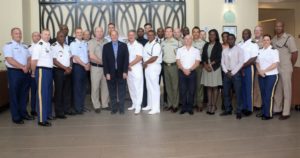
|
KINGSTON – April 11, 2018. For the fifth time since 2013, representatives from the Caribbean came together to foster regional collaboration, strengthen relationships, and share Information Operations (IO) tactics, techniques, and procedures to counter common threats affecting the region and support coordinated hurricane-relief operations. Military and security representatives from the Bahamas, Bermuda, Canada, France, Great Britain, Jamaica, Haiti, Netherlands, and Turks and Caicos gathered at the 5th Caribbean Region Information Operations Council (CRIOC) in Kingston, Jamaica, from March 26-29, 2018. CRIOC was hosted by the Jamaican Defence Force and sponsored by the IO divisions of U.S. Northern Command (NORTHCOM) and the U.S. Southern Command (SOUTHCOM). “CRIOC is a unique organization. We have NORTHCOM, SOUTHCOM, the British, and the Canadians, among other nations, working with our Caribbean partners,” said Dr. Benjamin P. Gochman, chief of engagements at NORTHCOM’s IO division. “It’s two geographic combatant commands working together with other countries, achieving success by fostering collaboration and not only looking at common threats to the region, but also to see how we can work collectively to confront them”. “CRIOC is an example of the effectiveness of NORTHCOM and SOUTHCOM collaborating together,” added Dr. Gochman. “We started CRIOC with Bermuda, Bahamas, and Turks and Caicos. In order to grow the organization, we partnered with SOUTHCOM. Jamaica, Haiti, and Trinidad & Tobago also joined. Now we are asking Barbados to join in.” During three days of discussion, participants discussed their hurricane-response capabilities and lessons learned from hurricanes Harvey, Irma, and Maria in 2017. They worked in groups to create a partner nation threat matrix, in which international organized crime, narcotrafficking, illegal weapons, gangs, and natural disasters were identified. They also presented ideas on how partner nations use information-related capabilities to counter their common challenges. The ability to counter common threats is a predominant regional concern. “The British, the French, the Canadians, and the United States are in Jamaica to express that our partners are serious about using information to help mitigate our shared common threats,” said Jamaica Defence Force Major Basil Jarret, civil-military cooperation and media affairs officer. “Through collaboration, discussion, and sharing information and ideas, we can come together with stronger, resilient solutions to the problems we face.” Strengthening IO capabilities Royal Bahamas Defence Force Lieutenant Commander Carlon Bethell, staff operations officer explains the operations and lesson learned after the hurricane season in 2017. (Photo: Geraldine Cook/Diálogo) CRIOC nations are shaping their IO capabilities. They analyzed their strengths and limitations and shared best practices for their own benefit as well as for that of the region. “IO can help mitigate common threats, as information is a valuable weapon. It’s not in Jamaica’s best interest to keep its knowledge and information to itself, but by sharing and exchanging this information, it opens us up to other and better ways of doing things. It’s a win-win for us,” said Maj. Jarret. “There are no longer any unique challenges, all our challenges are shared. What happens in Jamaica has a ripple effect in Haiti and in the United States, so the best way to treat it is to have all the affected countries sit down and share information and resources to create effective strategies to deal with threats.” Participants recognize the importance of IO. “It’s very important that we understand the basics of IO,” said Royal Bahamas Defence Force Lieutenant Commander Carlon Bethell, staff operations officer. “We can communicate our capabilities to our partners and also understand our partners’ capabilities, so we can work better together because we all are trying to achieve the same common goal, security for our region.” “IO help us [so] we don’t have to fight. We don’t have to use aggressive sources or manpower for that matter,” saidLt. Commander Bethell. “We make information work for us in many ways as we shape thoughts and ideas by showing other countries the good things we are doing, but also let our adversaries understand we have the means to deal with all the problems they create for us.” CRIOC partners recognize the importance of supporting each other. “The ability of CRIOC is to link people together. It’s the networks that are pretty important,” said British Armed Forces Colonel Paul L. Fish, British liaison officer at NORTHCOM. “IO gives everyone the ability to understand that we are working in the same environment. We all have different skillsets and abilities that we all can bring in and share amongst ourselves to mitigate threats to our environment.” “CRIOC meetings are important as we have face-to-face discussions and improve our networks,” said French Armed Forces in the West Indies Commander Mikaël Péron, chief of the Joint Operations Center. “It’s imperative we exchange information and improve cooperation for the next hurricane season because we all know, it will happen again.” CRIOC hopes to expand its membership to different branches of government, non-governmental organizations, and other entities. The goal is to gain the citizens’ trust and willingness to work together in defeating criminal activities. “We are in this together. We are all here as equal partners, and we must be able to share information and support each other in times of need,” Col. Fish told assistants at the closing ceremony. “Collaboration is key.” |
|